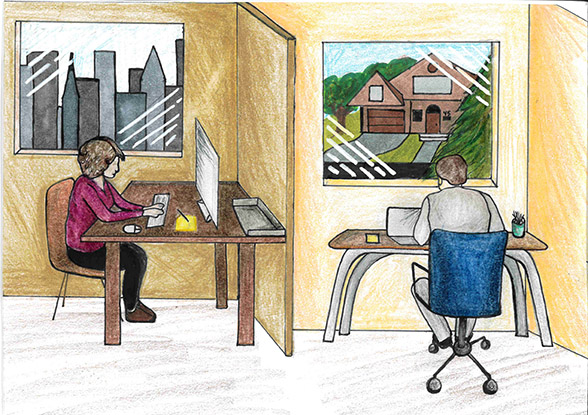OPINION: The internet could be better

Illustration
February 4, 2023
The internet has always been a social place. It was created to enable communication. But the rise of Facebook, Twitter, etc. has launched the social web to a scale unimaginable to its first users.
It was originally created for academic and military purposes– but now we use it for fun. While access to these platforms has increased exponentially, 93% of U.S. adults said they use the internet, yet most of us don’t have a lot of influence over the platforms themselves.
At the time, those who do have influence are not required to serve the public good, even if they provide a service that’s perceived to be useful– for instance, as a forum for public discussion. Though they might be used that way, Twitter’s only goal is to keep your eyes on the screen for as long as possible.
The flow of content follows convection patterns. On Instagram, we’re all filter-feeders. When participating in a digital economy of attention, the information is generated from you using the app: what you like, what you watch and for how long, etc. It is not only used to sell you shit but serves to inform what others see.
Hyper-connectedness is hard to undo when our brains are addicted to it, and every industry is now built on top of it. While social media isn’t entirely a bad thing, there are reasons why we might want to create alternatives to it– mental health being one reason.
When social networks take input from all their users and use this to hold our attention, unconsciously and implicitly, it leads us to see each other as commodities, rather than real people. Kids right now who grow up with social media will be more accustomed to this. If we want to connect with other people, we must be prepared to see things that aren’t tailored to us.
Like the neural algorithms they rely upon, social media platforms aren’t creative; they can’t truly create anything new by themselves. They rely entirely on the people who use their sites, paid or unpaid, to make their content.
Take zines, a form of art and communication that are ever non-commercial: the knowledge of how and why to create them is passed on when they’re published. Similarly, the skills required to code a site, and set up a web server aren’t always simple to figure out, but they are possible to learn. Those skills and knowledge should reside within the communities that need it, whether those communities originated online or in real life. If people choose to create non-commercial spaces, it divests from an industry that only reaffirms the relationships between content creators (exploited workers), users, and shareholders.
The internet sucks right now. There are kids in the same spaces as adults, unregulated hate speech, inescapable surveillance. And I’m not saying that there’s a quick and easy solution for all of these. I’m just saying that everyone has the right to make bad art, and the internet is the world’s biggest canvas.
I mean art that you make for you, that serves no purpose other than to express yourself. Someone said, if you write a poem on a piece of paper, and never show it to anyone else, you will be all the richer for it. With the compulsion to constantly share yourself that comes from mutual commodification, we miss out on that. It should be possible to share yourself slowly: it should be possible to stumble across something beautiful you never expected to see.
The internet is a means of sharing knowledge. But more importantly, the internet is a means of expressing yourself and finding others, across great distances. That, to me, is a beautiful thing and an essential tool in our developing future.
I care about the way the internet’s going because it’s going the same place where we’re going. I grew up in a generation where we always had it, so I know it can matter– people can find themselves, and can lose themselves within it. It’s a place where collective culture is created every day. Whether or not we can make something less stressful, I think, is a question worth asking.






